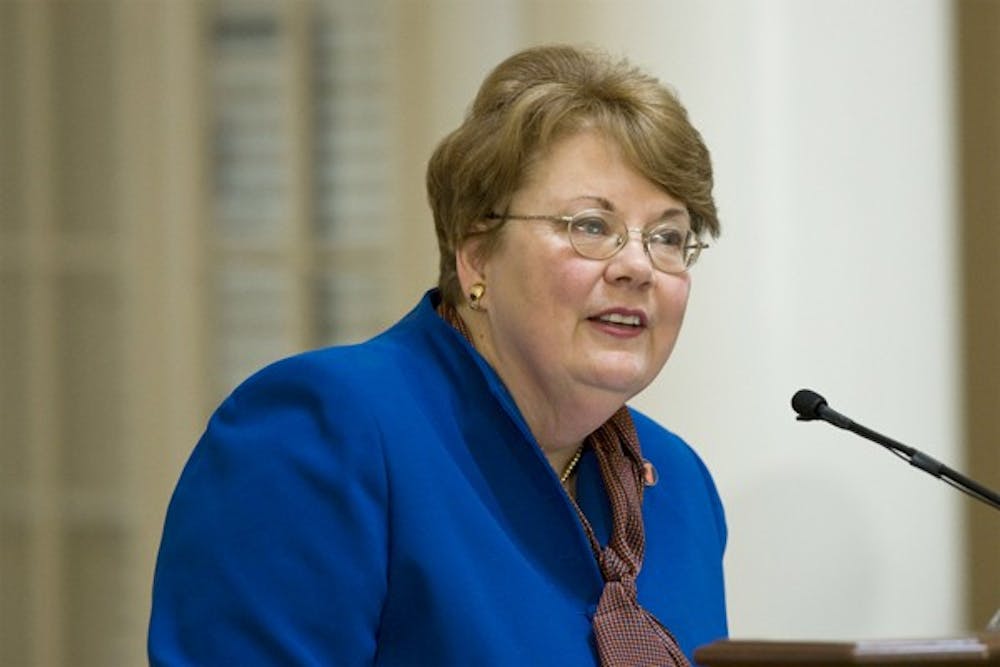Gathered before a crowd of administrators, faculty and community members in the Dome Room of the Rotunda, the Board of Visitors unanimously selected Teresa A. Sullivan as the University's eighth president Jan. 11 following a five-month search.
Sullivan replaces John T. Casteen, III, who will retire Aug. 1 after two decades at the helm. Sullivan currently serves as provost and executive vice president for academic affairs at the University of Michigan, a post she has held since 2006, and will become the University's first female president since the position was created in 1905.
At Michigan, Sullivan oversees a significant portion of the school's annual budget and is also a leading scholar in sociology - teaching classes and conducting research focusing primarily on labor force demography. Before moving to Michigan, she spent 27 years at the University of Texas, Austin, where she was the chief academic officer for the state institution's nine campuses.
Her background as an administrator and a scholar will enable her to achieve tangible results on grounds, said John Wynne, chair of the Board's Special Committee on the Nomination of a President. The hire marks the University's second recent courting of a prominent University of Michigan administrator; last year, the Board appointed Meredith Woo as the dean of the College.
After her introduction and a public reception in the Newcomb Hall Ballroom, Sullivan explained that her administrative experience helps to inform her work inside the classroom, and that, in many ways, the same goes for how her academic areas of expertise assist in managing and planning at the higher education level.
"I'm a data person," she said. "I believe in forming inferences by observing and collecting data. I do it when I'm teaching and when I'm doing administrative work."
During the months leading up to the announcement, University leaders touted the far-ranging implications of the presidential search, as well as the national spotlight it had garnered. Community members were asked to contribute to the hiring process during several open forums, and after narrowing its pool of candidates, the Board conducted interviews in undisclosed locations this month. Ultimately, Sullivan was deemed the best fit to succeed Casteen, who will leave office after two decades worth of accomplishments but also amid mounting commonwealth budget cuts.
Sullivan said she is well aware of the challenges she will immediately face, especially in the financial arena.
"The quality of higher education is threatened by increasing costs and declining state support," she said. "This cannot, however, keep us from our commitment to our students and to the states and the nation we serve. We must always honor our public mission - regardless of the level of the state's contributions to our budgets."
That mission, she explained, includes working to make both education and health care available to those who cannot afford it. In light of the country's ongoing financial problems and the obvious pressures associated with the Board's numerous goals for the University's eighth leader, Sullivan emphasized that her predecessor already completed a great deal of the most demanding work.
Wynne, in his introduction of Sullivan, said the University made immeasurable progress during Casteen's presidency, noting that he "set a high bar for performance." Though some community members debate his responsibility in a handful of on-Grounds controversies - including those pertaining to a living wage campaign and several sexual assault trials - Casteen also is generally acknowledged to have initiated the development of the nationally recognized AccessUVa financial aid program and to have expanded the University's ethnic and socioeconomic diversity. With Casteen's leadership, the University also embarked on its most ambitious capital development campaign and expanded its endowment to rival many private higher education institutions.
Moving forward, Wynne said the Board is confident Sullivan will continue Casteen's strong leadership style, adding that he and other committee members were impressed with her "integrity, experience and vision."
Looking to build upon much of the groundwork laid during Casteen's term, Sullivan said her first order of business is to become part of the University community and to learn more about its intricacies.
"Leadership," she said, "especially if it must implement change, should make decisions organically"; that is, resolutions are made - from the ground up - by a community of which Sullivan is only just becoming a part.







